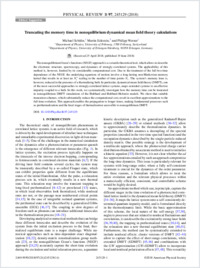Truncating the memory time in nonequilibrium dynamical mean field theory calculations
- Schüler, Michael Department of Physics, University of Fribourg, 1700 Fribourg, Switzerland
- Eckstein, Martin Department of Physics, University of Erlangen-Nürnberg, 91058 Erlangen, Germany
- Werner, Philipp Department of Physics, University of Fribourg, 1700 Fribourg, Switzerland
-
19.06.2018
Published in:
- Physical Review B. - 2018, vol. 97, no. 24, p. 245129
English
The nonequilibrium Green's functions (NEGF) approach is a versatile theoretical tool, which allows to describe the electronic structure, spectroscopy, and dynamics of strongly correlated systems. The applicability of this method is, however, limited by its considerable computational cost. Due to the treatment of the full two-time dependence of the NEGF, the underlying equations of motion involve a long-lasting non-Markovian memory kernel that results in at least an N3t scaling in the number of time points Nt. The system's memory time is, however, reduced in the presence of a thermalizing bath. In particular, dynamical mean field theory (DMFT), one of the most successful approaches to strongly correlated lattice systems, maps extended systems to an effective impurity coupled to a bath. In this work, we systematically investigate how the memory time can be truncated in nonequilibrium DMFT simulations of the Hubbard and Hubbard-Holstein models. We show that suitable truncation schemes, which substantially reduce the computational cost, result in excellent approximations to the full time evolution. This approach enables the propagation to longer times, making fundamental processes such as prethermalization and the final stages of thermalization accessible to nonequilibrium DMFT.
- Faculty
- Faculté des sciences et de médecine
- Department
- Département de Physique
- Language
-
- English
- Classification
- Physics
- License
-
License undefined
- Identifiers
-
- RERO DOC 322975
- DOI 10.1103/PhysRevB.97.245129
- Persistent URL
- https://folia.unifr.ch/unifr/documents/306943
Statistics
Document views: 109
File downloads:
- pdf: 240
